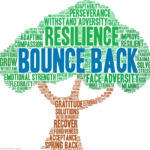The final component of resilience is grace, which provides a person with a purpose that guides their life decisions, influences behavior, shapes goals, offers a sense of direction and creates meaning. Dr. Hassett referred to a number of studies reporting evidence of the health effects of having a purpose in life, such as reduced anxiety and depression, better sleep, better nutrition and diet, increased willpower, improved immune system functioning, increased pain tolerance, healthier aging, decreased risk of heart attack and decreased incidence of Alzheimer’s disease.5–14
To help patients know or recognize a purpose in life, Dr. Hassett recommended they create a life statement that includes their values, passions, strengths and talents. The process of developing such a statement can help shape a meaning and purpose to life and provide feelings of hope, peace and contentment, even in times of adversity.
Dr. Hassett emphasized that providers play an important role in helping patients develop resiliency. “Healthcare practitioners are powerful figures and an affirmation from them can make a profound impact on their patients,” she said. Example: Providers can point out a strength they have noticed in their patient—such as creativity or persistence—and encourage the patient to tap into that strength to express what it’s like to live with chronic pain.
“It’s important to remember that each patient has unique strengths and resources,” she said.
Mary Beth Nierengarten is a freelance medical journalist based in Minneapolis.
References
- Crede M, Tynan MC, Harms PD. Much ado about grit: A meta-analytic synthesis of the grit literature. J Pers Soc Psychol. 2017 Sep;113(3):492–511.
- Buckingham A, Richardson EJ. The relationship between psychological resilience and pain threshold and tolerance: Optimism and grit as moderators. J Clin Psychol Med Settings. 2020 June 20. Online ahead of print.
- Kawasaki T, Tozawa R. Grit in community-dwelling older adults with low back pain is related to self-physical training habits. PM R. 2020 Oct;12(10):984–989. Epub 2020 Feb 15.
- Emmons RA, Stern R. Gratitude as a psychotherapeutic intervention. J Clin Psych. 2013 Aug;69(8):846–855.
- Ruini C, Fava GA. Well-being therapy for generalized anxiety disorder. J Clin Psychol. 2009 May;65(5):510–519.
- Frederickson BL, Grewen KM, Coffey KA, et al. A functional genomic perspective on human well-being. Proc Natl Acad Sci USA. 2013 Aug;110(33):13684–13689.
- Wood AM, Joseph S. The absence of positive psychological (eudemonic) well-being as a risk factor for depression: A 10-year cohort study. J Affect Disord. 2010 May;122(3):213–217.
- Krause N. Meaning in life and mortality. J Gerontol B Psychol Sci Soc Sci. 2009 Jun;64B(4):517–527.
- Cohen R. Bavishi C, Rozanski A. A purpose in life and its relationship to all-cause mortality and cardiovascular events: A meta-analysis. Psychosom Med. 2016 Feb-Mar;78(2);122–133.
- Hill PL, Turiano NA. Purpose in life as a predictor of mortality across adulthood. Psychol Sci. 2014 Jul;25(7):1482–1486.
- Boyle PA, Buchman AS, Barnes LL, et al. Effect of a purpose in life on incident Alzheimer disease and mild cognitive impairment in community-dwelling older persons. Arch Gen Psychiatry. 2010 Mar;67(3):304–310.
- Kim ES, Sun JK, Park N, et al. Purpose in life and reduced incidence of stroke in older adults: The health and retirement study. J Psychosom Res. 2013 May;74(5):427–432.
- Kim ES, Sun JK, Park JK, et al. Purpose in life and reduced risk of myocardial infarction among older US adults with coronary heart disease: A two-year follow-up. J Behav Med. 2013 Apr;36(2):124–133.
- Danhauer SC, Russell GB, Tedeschi RG, et al. A longitudinal investigation of posttraumatic growth in adult patients undergoing treatment for leukemia. J Clin Psychol Med Settings. 2013 Mar;20(1):13–24.



